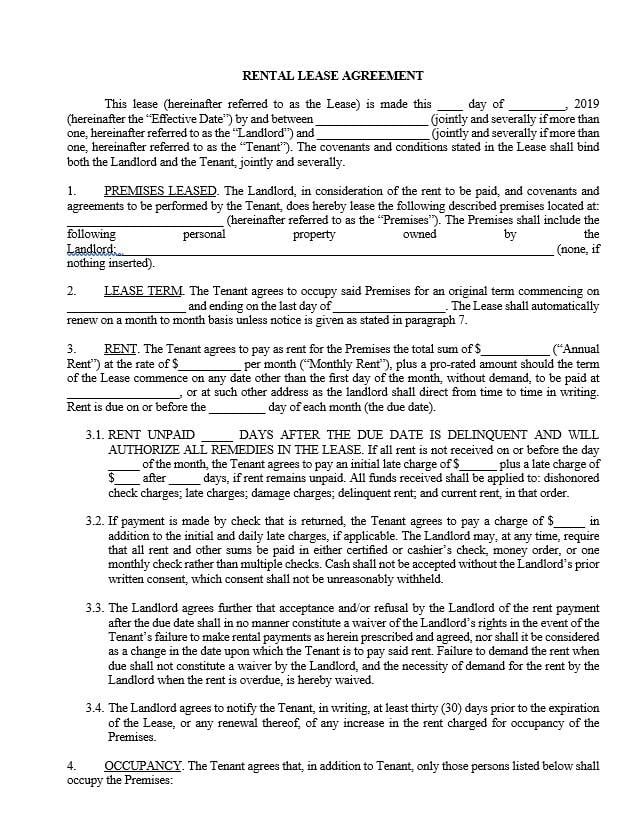
What is a commercial landlord? Who is responsible for a commercial lease? Its intention is to promote fairness in commercial leases , and landlords are encouraged to adhere to key points, which can be found here. Private landlord responsibilities If you are a landlord renting one or more residential properties, read our guide to private landlord responsibilities which takes a comprehensive look at all the rules and.
The responsibilities of parties to a commercial lease are different than those of a residential lease. Your lease will probably require (at a minimum) that you keep the property neat and in good order, and repair nonstructural problems in your rented space that you’ve caused. Tenant responsibilities generally fall into two categories: what you cannot do, and what you must do. See full list on nolo.
Having read through the list of common tenant duties, you can probably figure out what’s left to the landlord—simply put, all the housekeeping and repair chores that don’t concern your use of your rented space, including maintenance on major structural aspects of the building and building systems. Be sure your lease spells out the landlord’s responsibilities (many leases are completely silent on the subject). You and the landlord are free to allocate the maintenance and repair responsibilities as you wish—if the landlord wants to put you in charge of the building’s electrical switches and you agree, there’s no law against it. Similarly, if you bargain for the landlord to provide you with janitorial and handyman services, you may have no obligation to maintain even your own quarters. But keep in mind that there are sometimes hidden costs and risks that may result from taking on additional maintenan.
Normally commercial landlords are responsible for any structural repairs such as foundations, flooring, roof and exterior walls, and tenants are responsible for non-structural repairs such as air conditioning or plumbing. These obligations are drafted in a Commercial Lease , which outlines the rights and responsibilities between a commercial Landlord and the party who wishes to occupy the property. Most commercial lease agreements require that the tenant pay for normal repairs and maintenance within the leased space, while the landlord remains responsible for structural issues and common areas.
Depending on the nature of the repair you may wish to retain the ability to assess tenant’s for major repairs to the building. Health and safety responsibilities. Legally, there are a number of health and safety responsibilities you have as the landlord for a commercial property. However, in some cases the tenant will take responsibility for all or part of a health and safety concern – it depends what it says on the lease , so you should check this first. The starting point when determining maintenance responsibilities under a commercial lease is to take a look at the existing Lease agreement between the tenant and landlord.

The ADLS Deed of Lease , a document produced by the Auckland District Law Society, governs most leasing of commercial properties. A comprehensive commercial lease is key to preventing the majority of disputes relating to dilapidations. It should clearly set out who is responsible for repairing the various parts of the rented premises: the landlord , tenant or a third party. Customize, e-Sign, Print.
Hundreds Of Attorney Approved Forms For All Your Landlord Needs. Instant Downloa Mail Paper Copy or Hard Copy Delivery, Start and Order Now! Real Estate, Family Law, Estate Planning, Business Forms and Power of Attorney Forms. However, in a commercial lease , many of the building’s carrying costs get transferred to the tenant as “Additional Rent. A commercial lease is used when leasing property used primarily for a business.

You should never sign a lease without understanding all of its terms and conditions. Commercial landlord -tenant relationships bring their own unique circumstances. While certain aspects of the relationship are governed by statute, commercial landlords and tenants have the ability to circumvent these statutory protections through contract. The majority of a commercial lease agreement deals with what happens and who is financially responsible if something unpleasant occurs. In a gross lease , the tenant’s rent covers all property operating expenses.
These expenses can include, but aren’t limited to, property taxes, utilities, maintenance, etc. Rental Applications, Lease Agreements, Credit Reports. Before you approach a landlord , you should understand how commercial leases differ from the more common residential variety, and before you sign anything, make sure you understand and agree with the basic terms of the lease , such as the amount of rent, the length.
This will ensure that your landlord will be motivated to make fixes to any problems you have reported about the building as soon as possible. Most commercial property rental leases provide that the landlord is responsible for making certain major repairs. These repairs generally include the roof, major building systems, including air conditioning, heating, plumbing, electrical and exterior walls and utilities.
The TI can be structured in many ways but ultimately it’s up to the tenant to decide if they or the landlord are responsible for managing the design and construction process. A recent Supreme Court decision found that the landlord was responsible for carrying out building works directly related to the fire safety and fire resistant condition of the premises in question. The language of the commercial lease was critical in the Court’s decision. The reason I ask is because I thought that in a residential lease the landlord is required to replace the carpet after a certain amount of years and wondered if that applies to commercial properties.
It is a 50-month lease. Landlords in all states but Arkansas are responsible for maintaining fit and habitable housing and repairing rental property, and this extends to fixing leaking pipes, windows, and roofs—the causes of most mold.
No comments:
Post a Comment
Note: Only a member of this blog may post a comment.